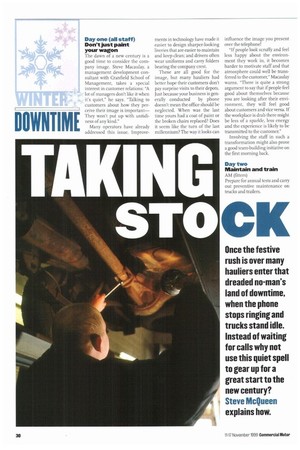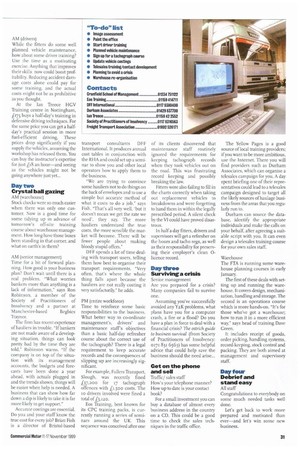1111( NG so
Page 32

Page 33

If you've noticed an error in this article please click here to report it so we can fix it.
Cit
Once the festive rush is over many hauliers enter that dreaded no-man's land of downtime, when the phone stops ringing and trucks stand idle. Instead of waiting for calls why not use this quiet spell to gear up for a great start to the new century? Steve McQueen explains how.
Day one (all staff) Don't just paint your wagon
The dawn of a new century is a good time to consider the company image. Steve Macaulay, a management development consultant with Cranfield School of Management, takes a special interest in customer relations: "A lot of managers don't like it when it's quiet," he says. "Talking to customers about how they perceive their image is important— They won't put up with untidiness of any kind."
Many operators have already addressed this issue. Improve
ments in technology have made it easier to design sharper-looking liveries that are easier to maintain and keep clean; and drivers often wear uniforms and carry folders bearing the company crest.
These are all good for the image, but many hauliers had better hope their customers don't pay surprise visits to their depots. Just because your business is generally conducted by phone doesn't mean the office should be neglected. When was the last time yours had a coat of paint or the broken chairs replaced? Does it seem like the turn of the last millennium? The way it looks can
influence the image you present over the telephone!
"If people look scruffy and feel less happy about the environment they work in, it becomes harder to motivate staff and that atmosphere could well be transferred to the customer," Macaulay warns. "There is quite a strong argument to say that if people feel good about themselves because you are looking after their environment, they will feel good about customers and vice versa. If the workplace is drab there might be less of a sparkle, less energy and the experience is likely to be transmitted to the customer."
Involving the staff in such a transformation might also prove a good team-building initiative on the first morning back.
Day two Maintain and train
AM (fitters) Prepare for annual tests and carry out preventive maintenance on trucks and trailers.
AM (drivers) While the fitters do some well planned vehicle maintenance, how about some driver training? Use the time as a motivating exercise. Anything that improves their skills now could boost profitability. Reducing accident damage costs alone could pay for some training, and the actual costs might not be as prohibitive as you thought.
At the Ian Treece HGV Training centre in Nottingham, t75 buys a half-day's training in defensive driving techniques. For the same price you can get a half. day's practical session in more fuel-efficient driving. These prices drop significantly if you supply the vehicles, assuming the workshop has released them. You can buy the instructor's expertise for just £18 an hour—and seeing as the vehicles might not be going anywhere just yet...
Day two
Crystal ball gazing AM (warehouse) Stock checks were so much easier when there was only one customer. Now is a good time for some tidying up in advance of tomorrow's off-site training course about warehouse management. How long have those boxes been standing in that corner, and what on earth's in them?
AM (senior management) Time for a bit of forward planning. How good is your business plan? Don't wait until there is a real problem. "What worries bankers more than anything is a lack of information," says Ron Robinson, a member of the Society of Practitioners of Insolvency and a partner at Manchester-based Begbies Traynor.
The firm has recent experience of hauliers in trouble. "If bankers are not made aware of a developing situation, things can look pretty bad by the time they are told," Robinson warns. "If the company is on top of the situation with its management accounts, the budgets and forecasts have been done a year ahead, with actuals plugged in and the trends shown, things will be easier when help is needed. A business that can show how far down a dip is likely to take it is far more likely to get support."
Accurate costings are essential, Do you and your staff know the true cost for every job? Brian Fish is a director of Bristol-based
transport consultants D F F
International. It produces annual cost tables in conjunction with the RH A and could set up a seminar to show you and other local operators how to apply them to the business.
"We are trying to convince some hauliers not to do things on the back of envelopes and to use a simple but accurate method of what it costs to do a job," says Fish. "That's all very well, 'but it doesn't mean we get the rate we need', they say. The more hauliers understand the true costs, the more sensible the market will become. There will be fewer people about making bloody stupid offers."
DF F spends a lot of time dealing with transport users, telling them how best to organise their transport requirements. "Very often, that's where the whole thing falls apart because the hauliers are not really costing it very satisfactorily," he adds.
PM (entire workforce) Time to reinforce some basic responsibilities to the business. What better way to co-ordinate management's, drivers' and maintenance staff's objectives than a basic half-day refresher course about the correct use of the tachograph? There is a legal requirement to keep accurate records and the consequences of slipping up are increasingly significant.
For example, Fullers Transport, Slough, was recently fined £37,200 for 17 tachograph offences with £1,500 costs. The to drivers involved were fined a total of £5,120.
Eos Training, best known for its CPC training packs, is currently running a series of seminars around the UK. This sequence was conceived after one of its clients discovered that maintenance staff routinely ignored the requirements for keeping tachograph records when they took vehicles out on the road. This was frustrating record keeping and possibly breaking the law.
Fitters were also failing to fill in the charts correctly when taking out replacement vehicles to breakdowns and were forgetting to hand them in within the legally prescribed period. A silent check by the VI could have proved disastrous.
In half a day fitters, drivers and supervisors will get a refresher on the hours and tacho regs, as well as their responsibility for preserving their employer's clean 0licence record.
Day three Surviving a crisis
Senior management Are you prepared for a crisis? Many companies fail to survive one.
Assuming you've successfully avoided any Y2 K problems, what plans have you for a computer crash, a fire or a flood? Do you have a plan in force to deal with a financial crisis? The ostrich guide to business survival (from Society of Practitioners of Insolvency: 0171 831 6563) has some helpful advice that could help save the business should the need arise...
Get on the phone and sell
Traffic/ ,;ales staff How's your telephone manner? How up to date is your contact book?
For a small investment you can buy a database of almost every business address in the country on a CD. This could be a good time to check the sales techniques in the traffic office.
The Yellow Pages is a good source of local training providers; if you want to be more ambitious, use the Internet. There you will find providers such as Durham Associates, which can organise a telesales campaign for you. A day spent briefing one of their representatives could lead to a telesales campaign designed to target all the likely sources of haulage business from the areas that you regularly run to.
Durham can source the database, identify the appropriate individuals and make the calls on your behalf, after agreeing a suitable script with you. It can even design a telesales training course for your own sales staff.
Warehouse The FTA is running some warehouse planning courses in early January.
The first of these deals with setting up and running the warehouse. It covers design, mechanisation, handling and storage. The second is an operations course which is more hands-on. "It's for those who've got a warehouse; how to run it in a more efficient way," says head of training Dave Green.
It includes receipt of goods, order picking, handling systems, record-keeping, stock control and packing. They are both aimed at management and supervisory staff.
Day flaw
Debrief and stand easy All staff Congratulations to everybody on some much needed tasks well done.
Let's get back to work more prepared and motivated than ever—and let's win some new business.
"To-do" list
• Image assessment • Paint the office • Start driver training • Planned vehicle maintenance • Sign up for a tachograph course • Update vehicle costings
• Telesales training/contact development
• Planning to avoid a crisis • Warehouse re-organisation
Contacts
Cranfield School of Management 01234 751122 Eos Training 01159 414711 DFF International 0117 9380400 Durham Associates 01429 837700 Ian Treece 01159 42 2552 Society of Practitioners of Insolvency 0117 8316563 Freight Transport Association 01892 526171












































































































